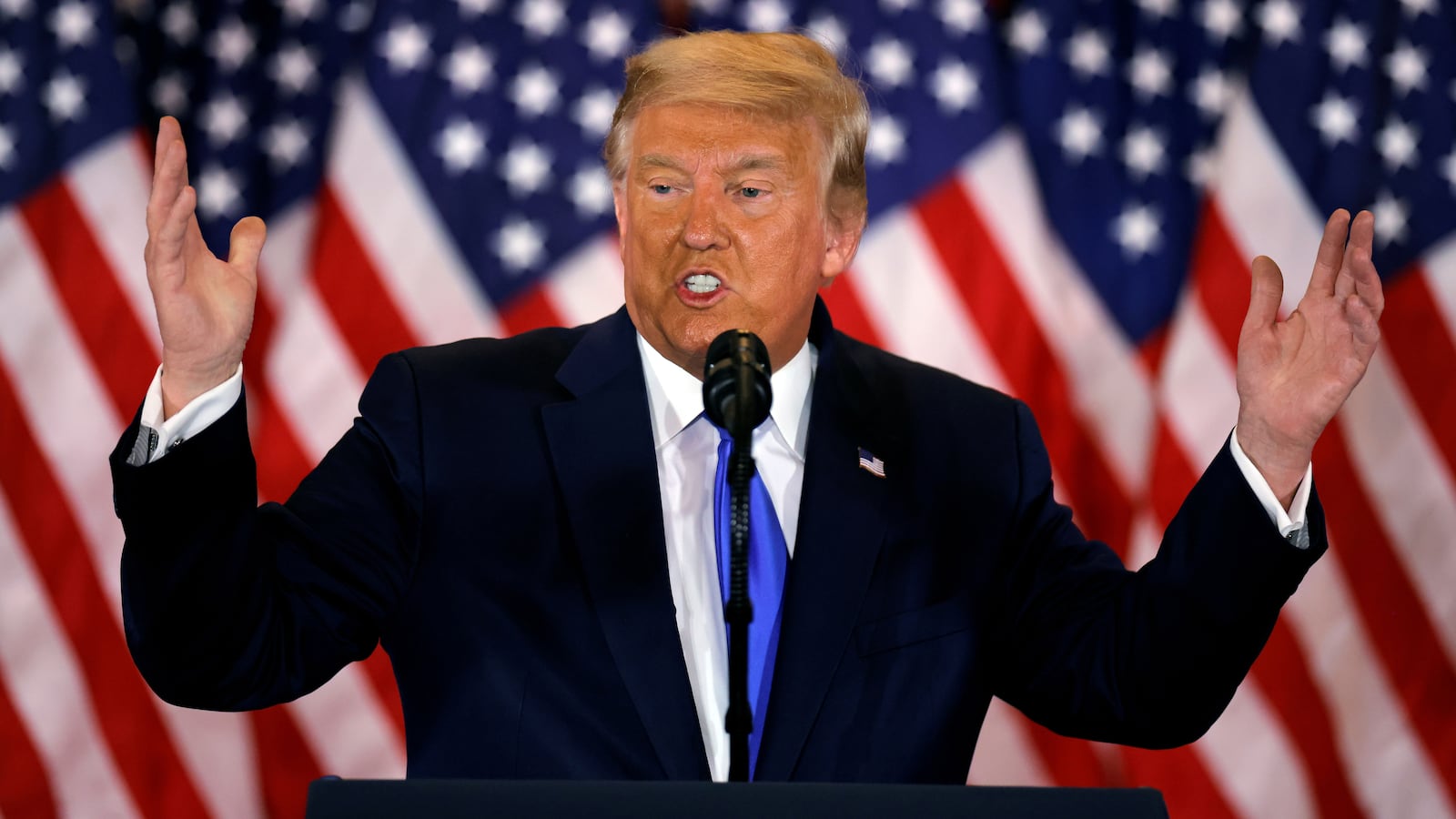There are a lot of things to be worried about right now, but court cases challenging the election are not yet one of them—and that includes President Donald Trump’s wild 2 a.m. demand for “all voting to stop” and the Supreme Court to step in.
More precisely, you don’t need to worry about these cases in court. The legal and factual challenges are either too small or too unlikely to prevail.
But if you care about the peaceful transition of power, you do need to worry about them in the court of public opinion—specifically, their impact on people watching Fox News and further-right media channels who will magnify these actually quite small challenges into a general sense of fear, uncertainty, and doubt about the election.
Let’s take a look.
1. The Pennsylvania Challenges
Republicans are now in court challenging aspects of Pennsylvania’s method for counting mail-in (a/k/a absentee) ballots. But these challenges are actually quite limited: They are about mail-in ballots that were improperly filled out and that Pennsylvania election officials allowed voters to fix later. They are not about all mail-in ballots.
Current estimates of the number of ballots in question are several dozen. That’s it.
Now, even that tiny number could, of course, matter, if Pennsylvania 2020 is as close as Florida 2000. But if –big if—the estimates are right about the blue-ness of the mail-in ballots in general, that should be enough to push the state into Biden’s column without a few dozen ballots mattering. And if the estimates are wrong, they won’t matter either because Trump will win the state.
In other words, even if the Republicans prevail in these challenges, it probably won’t be enough to make a difference.
2. “Late” Mail-In Ballots
For the last several months, Pennsylvania Republicans have also challenged a state court order that requires mail-in ballots mailed by but received after November 3 to still be counted, unless there’s evidence that they were mailed late, i.e., a late postmark.
They have lost this battle several times, including twice at the Supreme Court. The reason, as Chief Justice Roberts wrote, is that the core issue of the case is a matter of state law—specifically, a provision of the Pennsylvania constitution—and decided by a state court. That’s why the Supreme Court has upheld ballot extensions in Pennsylvania and North Carolina, but not in Wisconsin, where a federal court had crafted a similar order.
However, Republicans still have hope. The Pennsylvania cases were heard before Justice Barrett joined the Court, and were deadlocked 4-4, which left the lower court orders in place. If a similar case were to come up now, it’s reasonable to think that they could go 5-4 for the Republicans.
To be fair to Justice Barrett, there is not much in her record that indicates how she would vote in such a case. That’s not true of Justice Kavanaugh, who wrote one of the worst Supreme Court opinions in recent years last week, misconstruing precedent and saying that the Supreme Court should absolutely overrule state courts’ interpretations of state legal issues. (Even nonpartisan legal observers called it “sloppy.”) But in theory, we don’t really know how she’d come down.
But to be objective about Justice Barrett, she had a perfect, 100 percent record voting for substantively-conservative results as a federal judge, regardless of the legal contexts of precedents in play. That is astonishing. So, again, it’s reasonable to think she’d keep up that record now.
It’s even possible that a challenge to another state’s ballot extension policies might affect those in Pennsylvania. The 4-4 deadlocks were specific to Pennsylvania, after all; if there’s a 5-4 opinion that sets a general principle similar to what Justice Kavanaugh floated last week, that could throw out thousands of mail-in ballots in the Keystone State.
In the end, though, this possibility shouldn’t keep you awake at night. One principle that nearly all Supreme Court justices agree on is “reliance.” When voters rely on the rules being a certain way and cast their ballots accordingly, the Supreme Court is very reluctant to change those rules later.
So, in the Pennsylvania case, if I mailed my ballot in on Monday, when it was totally acceptable to do so, it’s unlikely that the Court will retroactively invalidate it. (We saw a similar principle at work in a case about Texas’s drive-through polling places; the judge considered closing them for the future, but not throwing out the ballots cast in the past.)
Of course, as we’ve seen in past election cases, anything is possible when the stakes are this high. But it’s still just an outside chance.
3. “The Supreme Court!!!”
Finally, exactly as predicted, President Trump has baselessly alleged fraud, promoted conspiracy theories, and demanded that the Supreme Court somehow get involved.
However, to quote an often-memed insurance commercial, that’s not how any of this works.
The Supreme Court requires an active case or controversy to “get involved.” And right now, the only significant cases are the two I’ve already mentioned. Because, unlike on Fox & Friends, there actually needs to be some evidence of voter fraud for a legal case to have merit. You can’t just say so.
And there is no evidence. Even the White House’s own task force could only find 1,071 cases of fraud in the entire country—and the vast majority of them were mistakes, not malevolence. Even generously, that’s a fraud rate of .01 percent. That’s why every court case about voter fraud has lost, even those starring Kris Kobach, Trump’s fraud-chaser-in-chief.
For now, at least, the Supreme Court is not Breitbart.
However, let me not end on a comforting note. While you shouldn’t worry about these legal challenges in court, you should worry a great deal about their effect on public opinion. What the vast majority of Americans will hear about these cases is not the legal details of federalism or ballot-curing, but LAWSUITS! COURT! LITIGATION!
And in that context, these relatively frivolous court cases could have a significant impact. They suggest that something fishy is going on, that the election itself is being called into question, that Democrats are trying to put one over on the American people. Which, of course, is exactly what Trump and his minions are saying, over and over again.
In that regard, the legal challenges are a smart tactical move. Even though they’re about nothing, they look like they’re about something. And whether it’s brownshirt violence on the streets or irresponsible “journalism” on the internet, the impact could be devastating.







